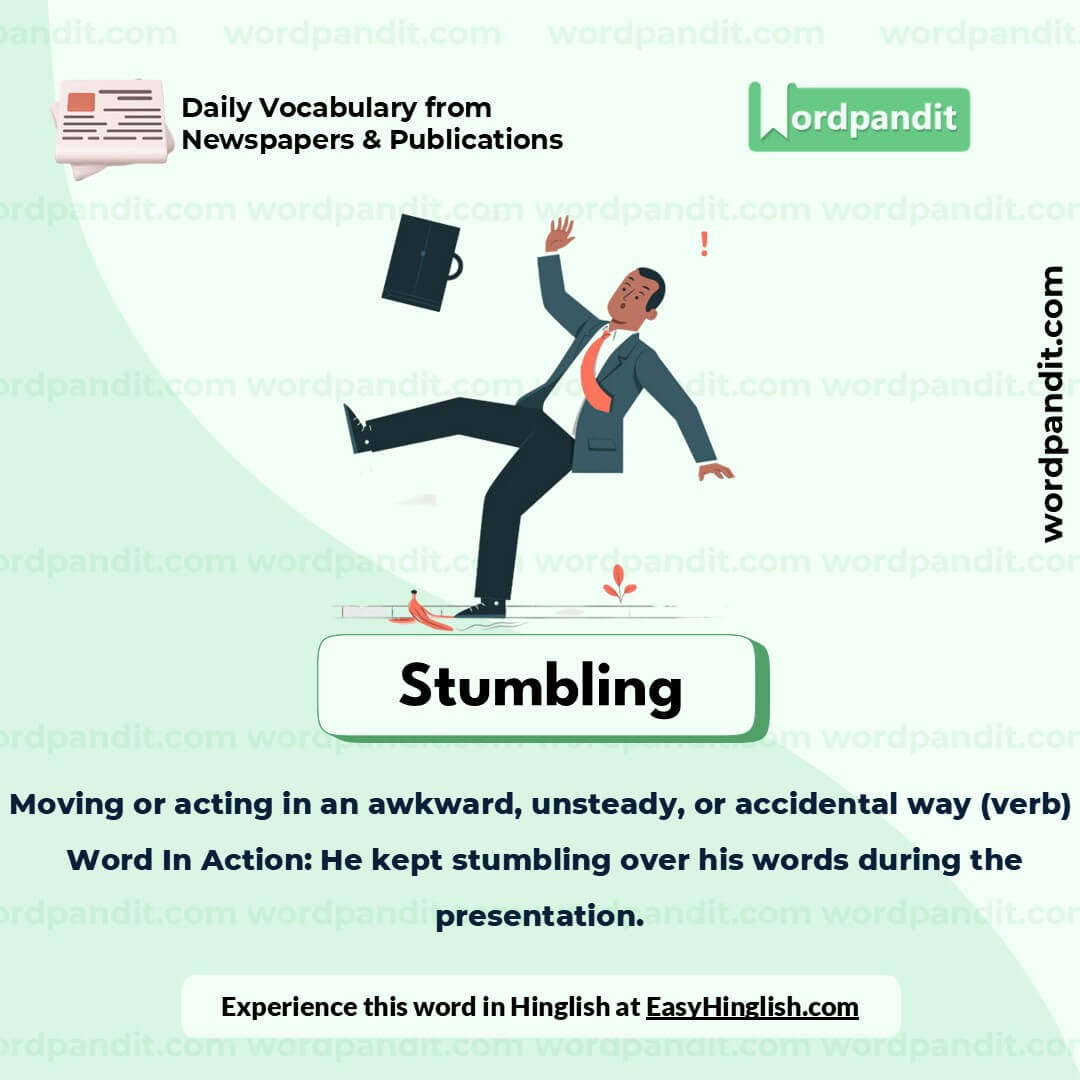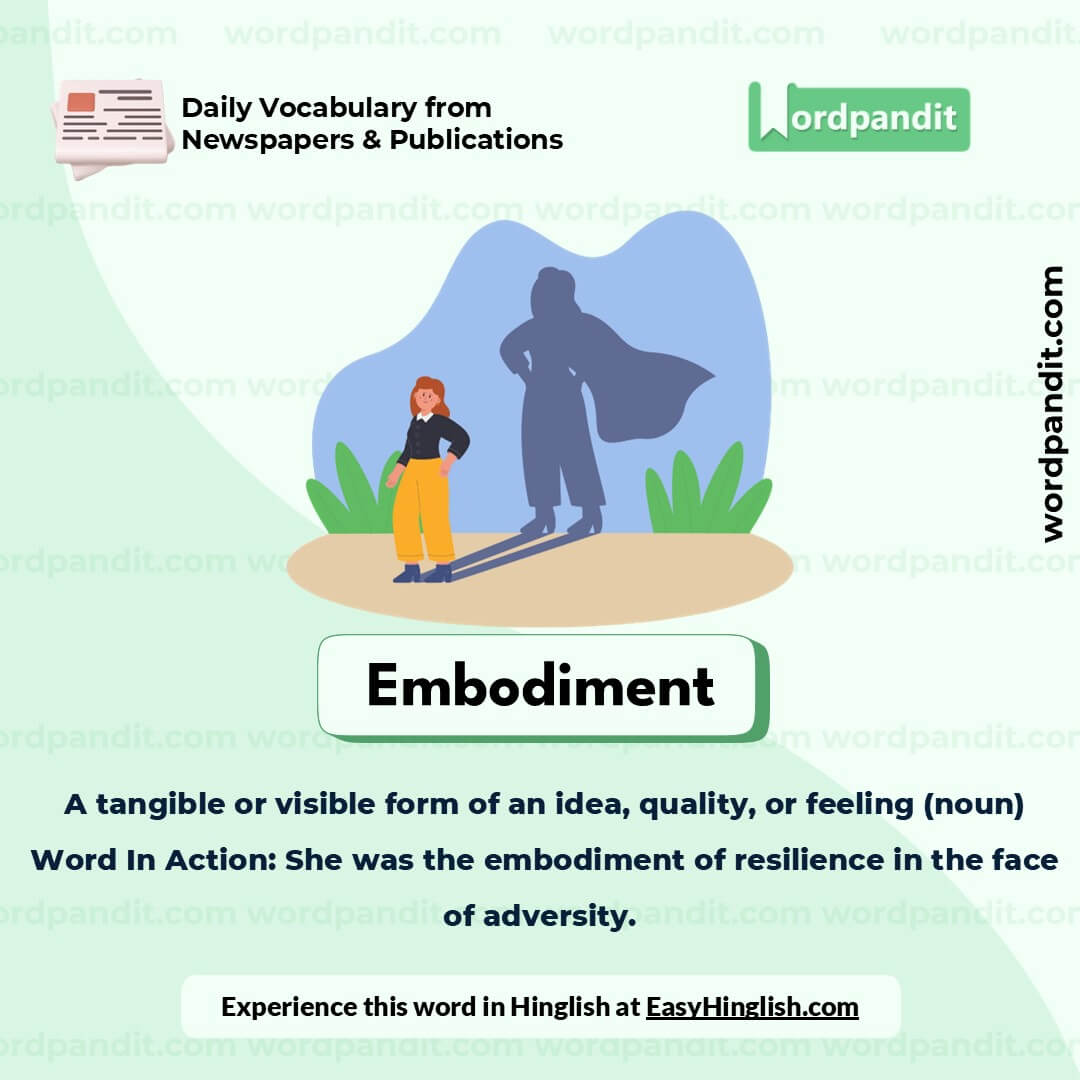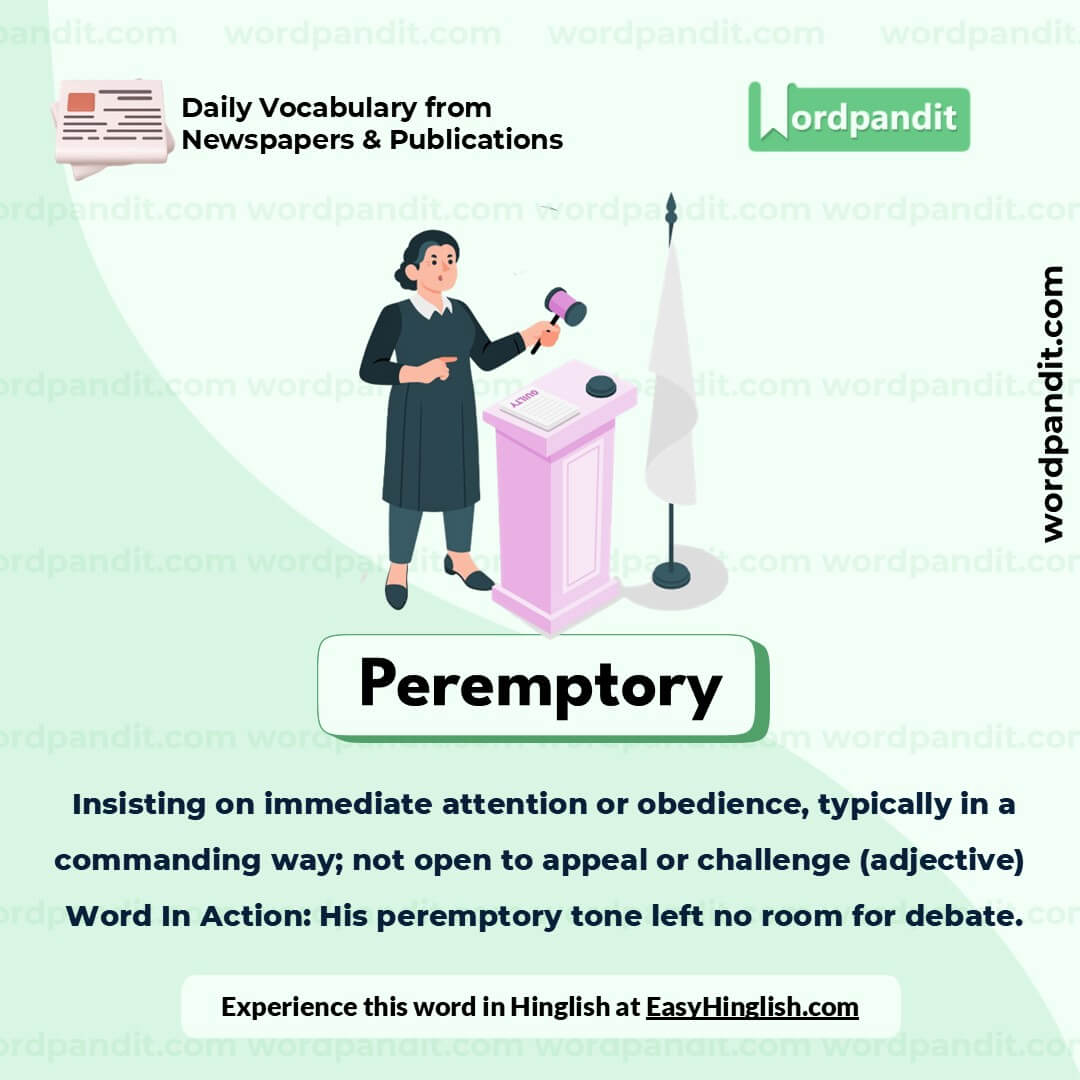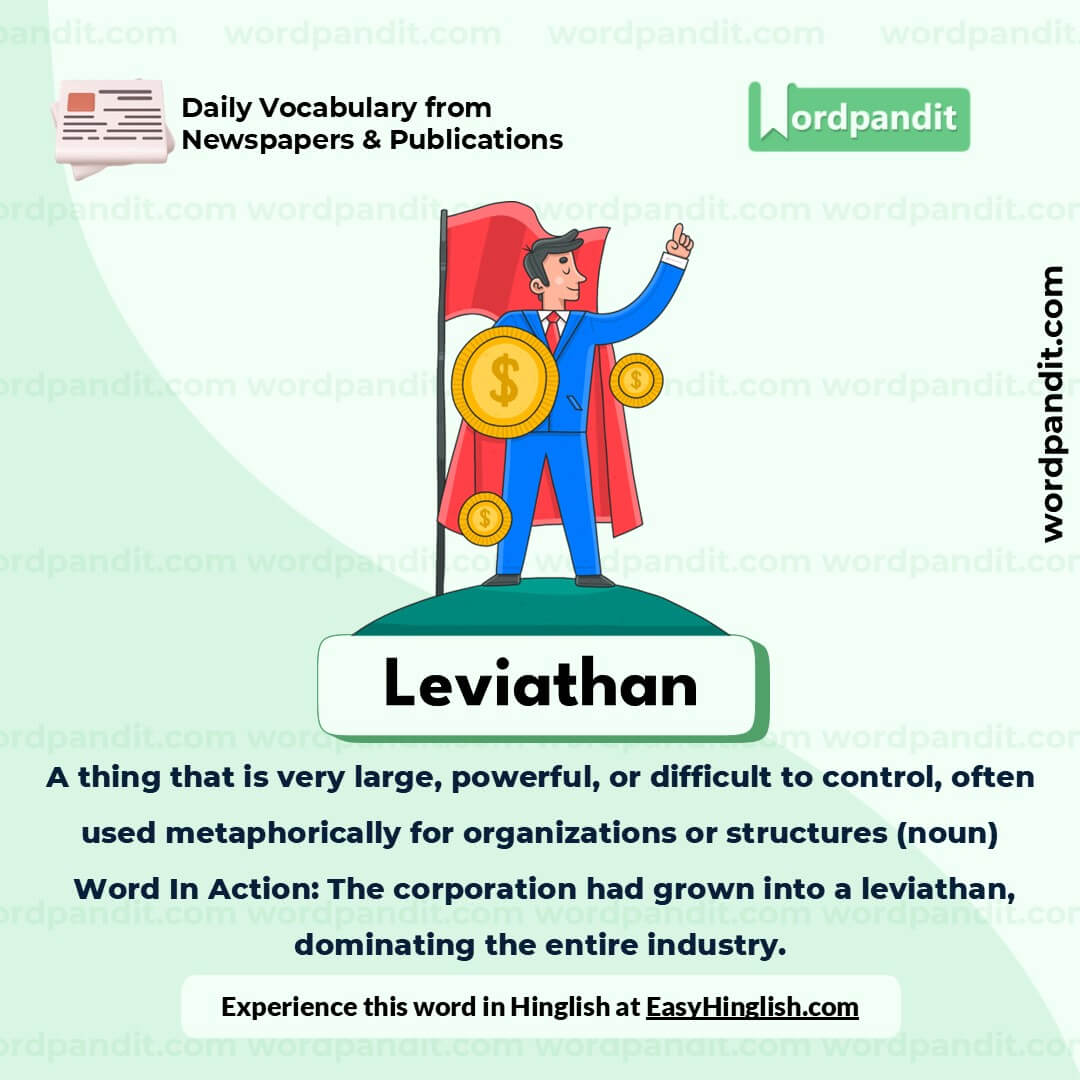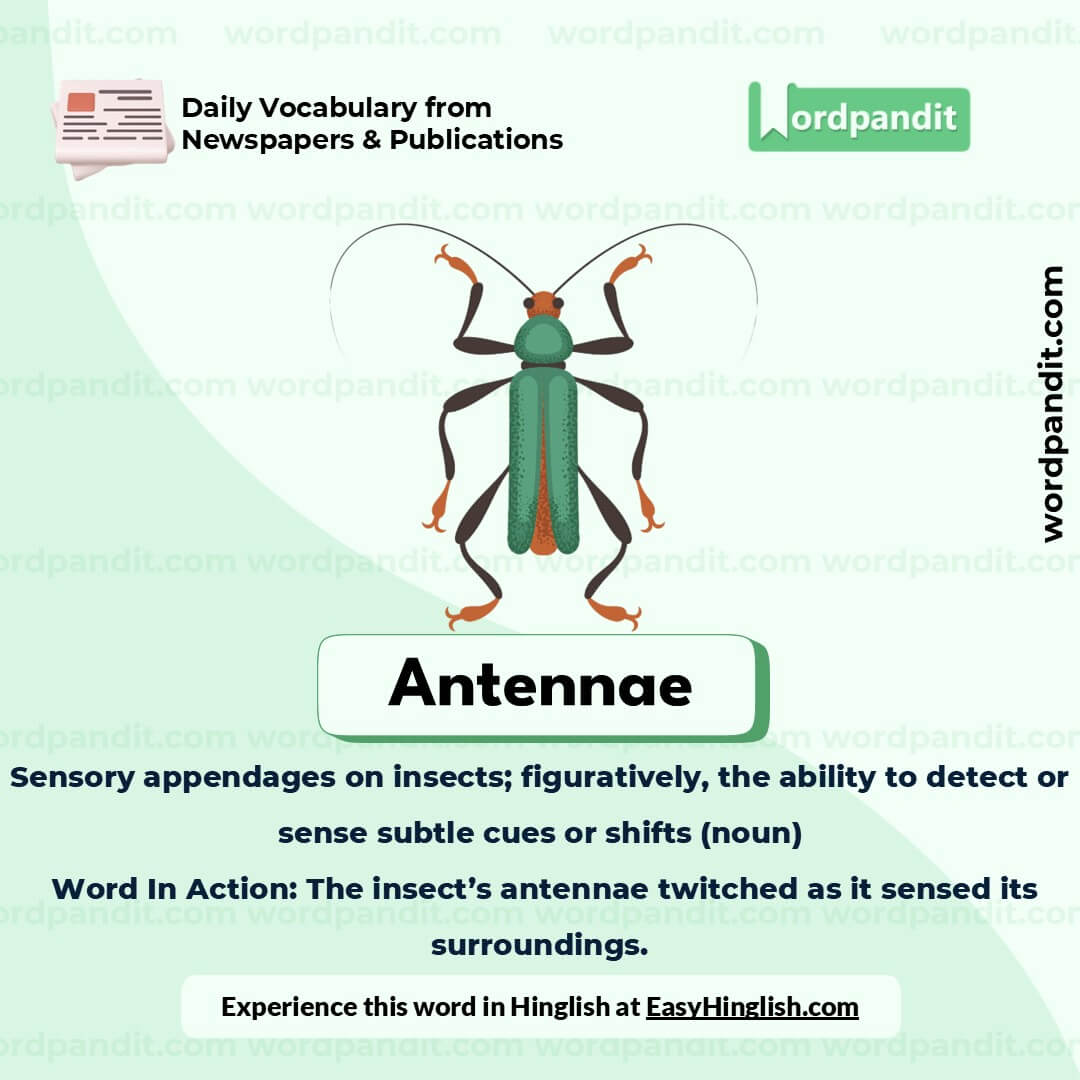Daily Vocabulary from International Newspapers and Publications
Expand Your Vocabulary with Wordpandit’s Global Vocabulary Hub
At Wordpandit, we are committed to helping you develop a truly global vocabulary by drawing from some of the most respected international publications. This section is designed to keep you ahead of the curve by introducing you to words that define global conversations and trends.
The Power of Global Sources
To help you think and communicate on a global scale, we curate vocabulary from renowned international sources, such as:
- The New York Times
- The Washington Post
- BBC
- The Guardian
- The Economist
- Scientific American
- Psychology Today
- And many more...
Stay Global, Stay Competitive
Our daily updates from international publications ensure you are consistently exposed to new words that reflect global news and developments, making sure your vocabulary is not only current but also globally relevant.
Enhance Your Global Perspective
Whether you’re preparing for international exams, aiming to excel in global business communication, or want to enhance your language skills for personal growth, Wordpandit offers the resources you need to thrive in a global context.
Effective Learning, Global Reach
Our learning methodology combines global examples, memory aids, and interactive activities, allowing you to internalize new words effectively and apply them in real-world scenarios.
Begin Your Global Vocabulary Journey Now!
Why Choose Wordpandit?
Practical Learning: Focus on words you'll actually encounter in real-world reading, enhancing your comprehension and communication skills.
Diverse Content: From current affairs to scientific breakthroughs, our varied sources expose you to vocabulary across multiple domains.
Effortless Integration: Make Wordpandit a part of your daily routine. Just a few minutes each day can significantly boost your lexicon over time.
Your Path to Vocabulary Mastery
- Visit our Daily Vocabulary section regularly
- Explore new words and their usage in context
- Practice incorporating these words into your own writing and speech
- Track your progress as your vocabulary expands
Start Your Journey Today
Embark on your vocabulary enhancement journey with Wordpandit. By consistently engaging with our daily posts, you'll build a robust vocabulary that serves you well in academic, professional, and personal contexts.
Remember, a word a day keeps linguistic limitations at bay. Make Wordpandit your daily companion in the quest for vocabulary excellence!
WORD-1: Stumbling
Context:
"Stumbling into a row about a few Labour volunteers is just bad politics." - The Guardian
Explanatory Paragraph:
The word stumbling conveys the idea of moving unsteadily or making errors in the process, often unexpectedly. In this context, it implies a lack of control or preparation, as if one is caught off guard, possibly leading to unintended issues or conflicts.
Meaning: Moving or acting in an awkward, unsteady, or accidental way (verb)
Pronunciation: STUHM-bling
Difficulty Level: ⭐⭐ (Beginner)
Etymology: Originates from Middle English stumblen, related to the Norse word stamla meaning "to stagger or stumble"
Synonyms & Antonyms:
Synonyms: faltering, hesitating, slipping, tripping
Antonyms: steady, assured, confident, smooth
Usage Examples:
- She was stumbling over her words during the presentation, clearly nervous.
- After stumbling on a tree root, he quickly regained his balance.
- The company’s unexpected announcement left its partners stumbling to understand the implications.
- He stumbled through the dark room, searching for the light switch.
Cultural Reference:
"One stumble is enough to lose your balance, but not enough to lose the entire race." – Unknown
Think About It:
How do moments of "stumbling" impact progress or outcomes in areas of life like politics, business, or personal growth?
Quick Activity:
Write a short story about a character who stumbles (either literally or figuratively) and what they learn from the experience.
Memory Tip:
Remember "stumbling" by picturing someone struggling to maintain balance, a reminder of its meaning of acting unsteadily.
Real-World Application:
The term "stumbling" is frequently used in social and professional contexts to describe unexpected mistakes or awkward situations that can affect a person’s or organization’s image.
WORD-2: Embodiment
Context:
"Recent history suggests that any government’s political compass is a powerful embodiment of its survival instinct." - The Guardian
Explanatory Paragraph:
The word embodiment refers to something that represents or symbolizes a particular quality or idea in a clear and concrete way. When something is called an embodiment, it means that it serves as a living example or manifestation of a broader concept, like courage, freedom, or in this case, survival instinct.
Meaning: A tangible or visible form of an idea, quality, or feeling (noun)
Pronunciation: em-BAH-dee-ment
Difficulty Level: ⭐⭐⭐ (Intermediate)
Etymology: Derived from "embody," from Middle English embodien, combining em- (into) and body
Synonyms & Antonyms:
Synonyms: personification, manifestation, incarnation, representation, epitome
Antonyms: abstraction, disembodiment, separation
Usage Examples:
- She is the very embodiment of kindness, always going out of her way to help others.
- The statue stands as an embodiment of freedom and resilience.
- His bravery in difficult times made him the embodiment of courage in the community.
- The company’s values are an embodiment of their commitment to sustainability and ethics.
Cultural Reference:
"The Statue of Liberty is often considered the embodiment of freedom and democracy for the United States and the world." - Common cultural understanding
Think About It:
What qualities or values do you consider to be embodiments of leadership, and why?
Quick Activity:
Think of a public figure or fictional character that you see as an embodiment of a specific value, such as honesty or strength. Describe why you see them that way.
Memory Tip:
Remember "embodiment" by thinking of "em" (into) + "body"—an idea or quality "put into a body" or made real and visible.
Real-World Application:
The term "embodiment" is often used to describe individuals, symbols, or objects that strongly represent a particular set of ideals, making it useful in discussions about values, symbolism, and identity.
WORD-3: Peremptory
Context:
"The tangled rise and fall of Sue Gray; the peremptory cull of winter fuel payments." - The Guardian
Explanatory Paragraph:
The word peremptory describes an action or behavior that is decisive and allows no opportunity for debate or refusal. It’s often used to indicate a command or action that must be obeyed without question. In this context, a "peremptory cull" implies a sudden, authoritative decision to cut or reduce winter fuel payments without allowing for objection or delay.
Meaning: Insisting on immediate attention or obedience, typically in a commanding way; not open to appeal or challenge (adjective)
Pronunciation: puh-REMP-tuh-ree
Difficulty Level: ⭐⭐⭐⭐ (Advanced)
Etymology: From Latin peremptorius, meaning "destructive" or "decisive," derived from perimere (to take entirely)
Synonyms & Antonyms:
Synonyms: authoritarian, dictatorial, commanding, absolute, imperious
Antonyms: lenient, flexible, mild, open, deferential
Usage Examples:
- The manager issued a peremptory order that had to be followed without question.
- Her tone was peremptory, leaving no room for discussion.
- The teacher’s peremptory manner intimidated the students into silence.
- The company's peremptory decision to cut benefits led to widespread frustration among employees.
Cultural Reference:
"In military settings, orders are often peremptory, as obedience without delay is considered essential to discipline and effectiveness." - General understanding in military contexts
Think About It:
When, if ever, might a peremptory approach be justified? How can this style of decision-making impact morale?
Quick Activity:
Write a brief scenario in which a peremptory decision might lead to both positive and negative outcomes. What factors would influence its impact?
Memory Tip:
Think of "peremptory" as "pre-emptory," where someone pre-empts any discussion or opposition with a decisive command.
Real-World Application:
The word "peremptory" is often used in legal, military, or authoritative settings to describe commands or actions that are final and not open to appeal, emphasizing the need for compliance.
WORD-4: Leviathan
Context:
"Kamala Harris and Donald Trump are already running massively well-funded campaign leviathans." - The Guardian
Explanatory Paragraph:
The word leviathan refers to something that is immense, powerful, and often challenging to control. Originally, a leviathan was a monstrous sea creature mentioned in ancient texts. In modern usage, it often describes large, complex, and influential organizations or entities, such as corporations or political campaigns, that wield significant power and resources.
Meaning: A thing that is very large, powerful, or difficult to control, often used metaphorically for organizations or structures (noun)
Pronunciation: luh-VY-uh-thuhn
Difficulty Level: ⭐⭐⭐⭐ (Advanced)
Etymology: From Hebrew livyatan, meaning "twisted or coiled," first used to describe a mythical sea monster
Synonyms & Antonyms:
Synonyms: behemoth, colossus, giant, powerhouse, juggernaut
Antonyms: miniature, weakling, underdog, minor, small-scale
Usage Examples:
- The tech company grew into a corporate leviathan, influencing markets worldwide.
- The government bureaucracy felt like a leviathan, impossible to navigate or control.
- The movie studio was a leviathan, producing blockbuster hits year after year.
- Her charity started small but soon became a leviathan in the world of humanitarian aid.
Cultural Reference:
"In his book Leviathan (1651), philosopher Thomas Hobbes used the term to describe an all-powerful state, representing an absolute government necessary to maintain order." - Historical reference to Hobbes’ political philosophy
Think About It:
How can an organization or movement become a leviathan? What are the potential benefits and dangers of such concentrated power?
Quick Activity:
List two modern companies or institutions that could be considered leviathans. Describe the ways in which their size or influence impacts society.
Memory Tip:
Associate "leviathan" with "vast" to remember its sense of immense power and size.
Real-World Application:
"Leviathan" is often used to describe large corporations, governments, or campaigns that wield great influence, especially in contexts where their power feels overwhelming or uncontrollable.
WORD-5: Antennae
Context:
"Where were Labour’s political antennae in all this?" - The Guardian
Explanatory Paragraph:
The word antennae can refer to the sensory appendages on the heads of insects and other animals, which help them perceive their surroundings. In a figurative sense, "antennae" describes a person or group’s ability to sense, understand, or be aware of their environment, particularly in political or social contexts. In this example, Labour’s "political antennae" refers to its sensitivity or awareness regarding public opinion or important issues.
Meaning: Sensory appendages on insects; figuratively, the ability to detect or sense subtle cues or shifts (noun)
Pronunciation: an-TEN-ee
Difficulty Level: ⭐⭐ (Intermediate)
Etymology: From Latin antenna, meaning "sail yard" (originally referring to a ship’s rigging, later adapted to biology for sensory organs)
Synonyms & Antonyms:
Synonyms: sensitivity, awareness, perception, insight, intuition
Antonyms: unawareness, insensitivity, obliviousness, blindness, inattentiveness
Usage Examples:
- Politicians need to keep their antennae tuned to public sentiment to remain relevant.
- Her antennae for people’s emotions make her an empathetic counselor.
- The detective relied on his antennae to sense when someone was hiding the truth.
- Social media managers must have sharp antennae to catch trends early.
Cultural Reference:
"Journalists often develop ‘antennae’ for sensing emerging stories, allowing them to catch and report events as they unfold." - Common journalistic insight
Think About It:
What qualities or experiences might help someone develop strong "antennae" for social or political changes?
Quick Activity:
Reflect on a recent event where you noticed a shift in public opinion. How did your “antennae” pick up on this change?
Memory Tip:
Picture an insect’s antennae constantly moving to detect its surroundings, just like political “antennae” sense shifts in public opinion.
Real-World Application:
"Antennae" is a useful term in both biology and metaphorical language, describing not only physical sensory organs but also the ability to perceive subtle signals in complex social or political environments.


